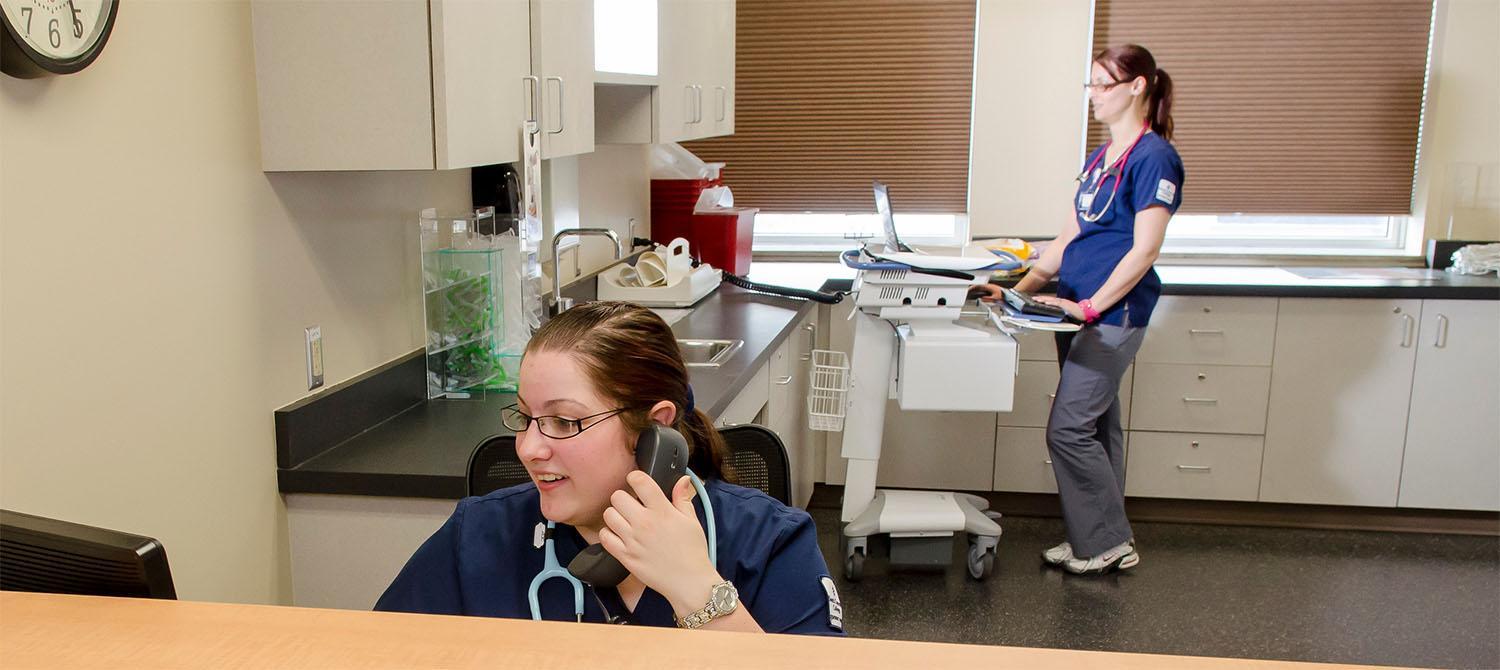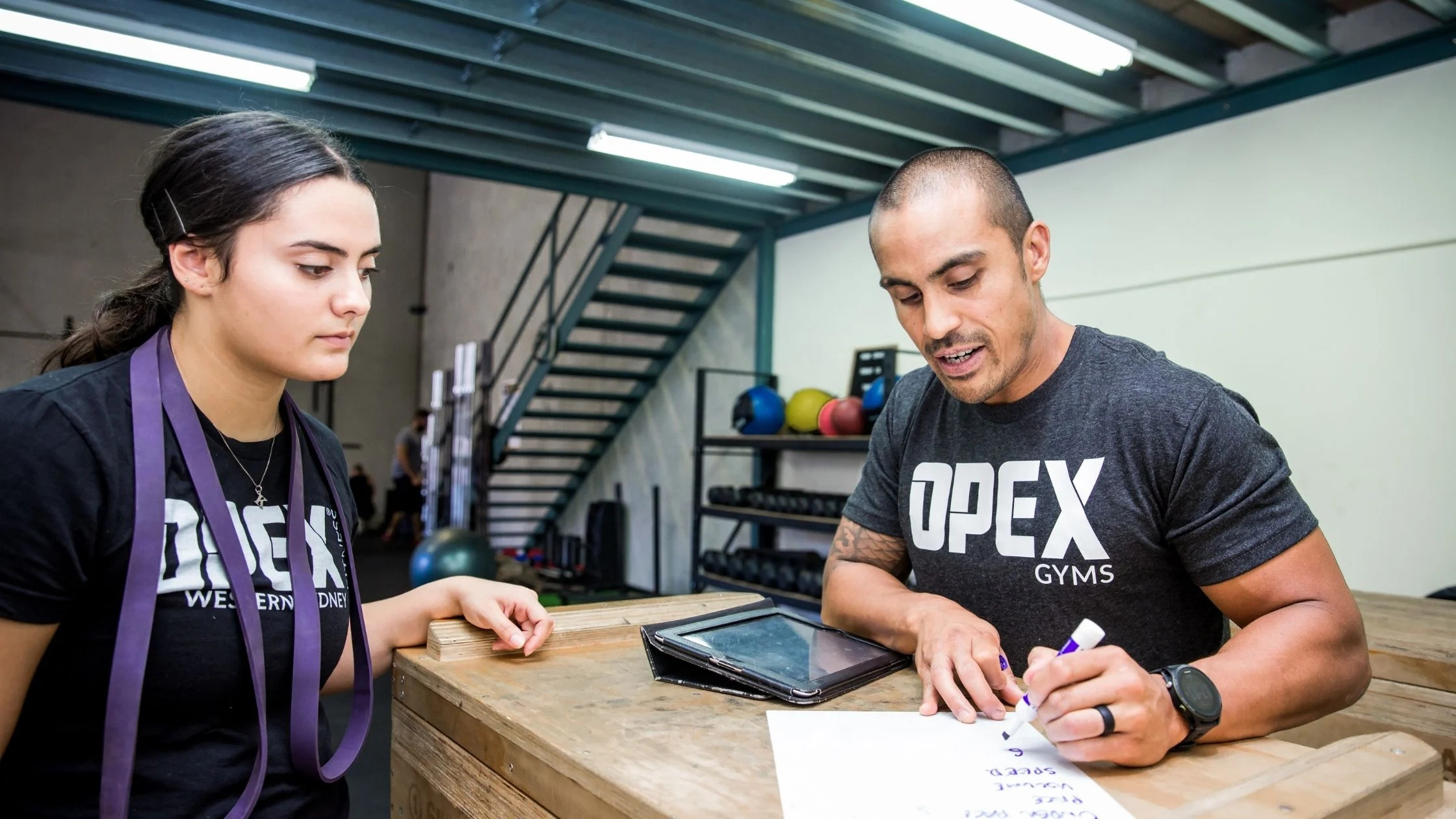

Featured
What Are Allied Health Professionals
Modified: January 2, 2024
Discover the world of allied health professionals and the various featured roles they play in healthcare. Learn more about their valuable contributions and specialized skills.
Introduction
Allied health professionals play a crucial role in the healthcare industry, providing essential services that support patient care and rehabilitation. These professionals work alongside medical doctors, nurses, and other healthcare professionals to deliver comprehensive and holistic healthcare services. Despite their often behind-the-scenes roles, their contributions are invaluable in promoting wellness, preventing illness, and assisting patients in their recovery.
While many people are familiar with doctors and nurses, the term “allied health professionals” may be less known. In this article, we will explore the definition, importance, responsibilities, and types of allied health professionals. We will also delve into the education and training requirements for these professionals, their roles across different healthcare settings, the importance of collaboration within interdisciplinary teams, and the challenges and opportunities they face. Finally, we will discuss the future outlook for allied health professionals and the vital role they will continue to play in the evolving landscape of healthcare.
As you delve into the world of allied health professionals, you will discover the vast range of specialties and services they provide. From physical therapists aiding in recovery after an injury, to respiratory therapists assisting patients with breathing difficulties, to speech-language pathologists assisting those with communication disorders, allied health professionals are instrumental in improving the quality of life for patients across all age groups and backgrounds.
It is important to recognize and appreciate the significant contributions of these professionals, as they play a vital role in the overall healthcare system. Their expertise, compassion, and dedication contribute to the well-being and quality of life of patients.
Now, let us delve deeper into the world of allied health professionals and gain a better understanding of their importance and the critical roles they fulfill in the healthcare industry.
Definition of Allied Health Professionals
Allied health professionals encompass a diverse group of healthcare workers who are not medical doctors or nurses but provide essential healthcare services. They work collaboratively with the medical team to deliver comprehensive and patient-centered care. Allied health professionals can be found in various healthcare disciplines, including rehabilitation, diagnostics, therapeutic care, and health promotion.
These professionals bring specialized skills and expertise to the healthcare team and contribute to the overall well-being of patients. They often work behind the scenes, but their impact is significant in promoting recovery, improving quality of life, and preventing further health issues.
Some common characteristics of allied health professionals include:
- Specialized Training: They undergo specialized education and training in their respective fields to gain proficiency in delivering specific healthcare services.
- Collaborative Approach: They work closely with other healthcare professionals, such as doctors, nurses, and therapists, to provide integrated and patient-centered care.
- Direct Patient Interaction: They directly interact with patients, assessing their needs, providing treatments, and educating them on self-care and prevention measures.
- Healthcare Support: They support the work of medical doctors and nurses by providing specialized services, diagnostic testing, therapy, and rehabilitation.
The term “allied health” originated in the mid-20th century as a way to identify a wide range of healthcare professions that are distinct from medical practice and nursing. These professionals are important members of the healthcare team and contribute to the delivery of safe, effective, and high-quality care.
Examples of allied health professionals include:
- Physical Therapists: They provide rehabilitative services to patients with physical impairments, helping them regain mobility, manage pain, and improve functionality.
- Occupational Therapists: They assist individuals with physical, developmental, or emotional challenges to regain or enhance their ability to perform daily activities, such as self-care and work-related tasks.
- Speech-Language Pathologists: They work with individuals of all ages who have communication and swallowing disorders, helping them improve their speech, language, and swallowing abilities.
- Radiologic Technologists: They perform medical imaging procedures, such as X-rays, CT scans, and MRI scans, to assist in the diagnosis and treatment of diseases and injuries.
These are just a few examples of the many allied health professions that exist. Each plays a critical role in the healthcare team and contributes to the comprehensive care of patients.
Now that we have a clear understanding of the definition and scope of allied health professionals, let us explore the importance of their role in the healthcare industry.
Importance of Allied Health Professionals
Allied health professionals play a vital role in the healthcare industry and have a significant impact on patient care and outcomes. Their contributions are invaluable in ensuring the well-being and recovery of individuals across various healthcare settings. Here are several reasons why these professionals are essential:
Comprehensive Healthcare: Allied health professionals provide specialized services that complement the care provided by medical doctors and nurses. They contribute to a holistic approach to healthcare by addressing the physical, emotional, and psychological needs of patients. This comprehensive care improves patient outcomes and enhances overall well-being.
Patient Rehabilitation: Many allied health professionals, such as physical therapists and occupational therapists, focus on rehabilitation. They help individuals regain lost functions, improve mobility, manage pain, and regain independence. Through targeted interventions and personalized treatment plans, these professionals play a vital role in improving the quality of life and functional abilities of patients.
Preventive Care and Health Promotion: Allied health professionals are actively involved in preventive care and health promotion. They educate individuals on healthy lifestyle choices, disease prevention, and self-care practices. Through interventions such as nutritional counseling, exercise programs, and wellness screenings, these professionals empower individuals to take control of their health and prevent the onset of chronic conditions.
Specialized Expertise: Each allied health profession requires specialized knowledge and skills. From speech-language pathologists who assist individuals with communication disorders, to respiratory therapists who provide respiratory support to patients with breathing difficulties, these professionals have unique expertise in their respective fields. By leveraging their specialized knowledge, allied health professionals contribute to accurate diagnoses, effective treatments, and improved patient outcomes.
Efficient Healthcare Delivery: The collaboration and integration of allied health professionals within interdisciplinary teams optimize healthcare delivery. By working alongside medical doctors, nurses, and other healthcare professionals, they contribute to a more efficient and coordinated approach to patient care. Their specialized skills and expertise allow for a streamlined flow of services and effective utilization of resources.
Addressing the Healthcare Workforce Gap: With the growing demand for healthcare services, allied health professionals play a crucial role in filling the workforce gap. As part of the healthcare team, they help alleviate the burden on medical doctors and nurses by providing specialized services, improving access to care, and reducing waiting times. Their presence enhances the efficiency and effectiveness of healthcare systems.
Overall, allied health professionals are essential to the healthcare industry. Their contributions not only improve patient outcomes, but also enhance the overall functioning of healthcare systems. These professionals are dedicated to providing compassionate care, promoting wellness, and improving the quality of life for individuals in need.
Now that we understand the importance of allied health professionals, let’s explore their role and responsibilities in more detail.
Role and Responsibilities of Allied Health Professionals
Allied health professionals have diverse roles and responsibilities within the healthcare industry. Their contributions span a wide range of disciplines and encompass various aspects of patient care and support. Here are some key roles and responsibilities of allied health professionals:
Assessment and Evaluation: One of the primary responsibilities of allied health professionals is to assess and evaluate patients’ conditions. They conduct thorough assessments, gather relevant data, and perform diagnostic tests to determine the best course of treatment. This process involves interpreting test results, identifying underlying issues, and collaborating with other healthcare professionals to formulate effective care plans.
Treatment and Interventions: Allied health professionals employ various treatment techniques and interventions to address patients’ specific needs. Whether it’s administering physical therapy exercises, implementing behavioral interventions, or providing speech and language therapy, these professionals utilize evidence-based approaches to promote recovery, manage symptoms, and improve functional abilities.
Education and Counseling: Another critical aspect of their role is patient education and counseling. Allied health professionals educate patients about their conditions, treatment options, and self-care techniques. They provide guidance on lifestyle modifications, medication management, and strategies for preventing further health issues. This empowers patients to actively participate in their own care and make informed decisions for their well-being.
Collaboration and Communication: Allied health professionals work collaboratively with other members of the healthcare team to ensure coordinated and comprehensive care. They actively communicate with medical doctors, nurses, therapists, and support staff to exchange information, discuss treatment plans, and address any concerns. This interdisciplinary approach allows for effective teamwork and enhances patient outcomes.
Research and Evidence-Based Practice: Many allied health professionals engage in research activities to advance their respective fields. They contribute to the development of evidence-based practices and stay current with the latest research findings. By incorporating research into their clinical practice, they ensure that their interventions and treatments are based on the most up-to-date and effective approaches.
Advocacy and Health Promotion: Allied health professionals also advocate for the health and well-being of patients and their communities. They engage in health promotion initiatives, raise awareness about preventive health measures, and advocate for policies that improve access to care and support vulnerable populations. By being advocates, they contribute to public health and address social determinants of health.
Quality Assurance and Compliance: These professionals adhere to professional standards, codes of ethics, and legal regulations in their practice. They ensure that their interventions and treatments are safe, effective, and meet quality standards. Allied health professionals also actively engage in professional development activities to enhance their skills and stay abreast of advancements in their field.
These are just a few examples of the roles and responsibilities of allied health professionals. The specific duties may vary depending on the profession and healthcare setting. Nonetheless, their collective efforts contribute to the delivery of high-quality, patient-centered care and support.
Now that we have explored the roles and responsibilities of allied health professionals, let’s delve deeper into the different types of professionals within this diverse field.
Types of Allied Health Professionals
The field of allied health comprises a wide range of professions, each specializing in a specific area of healthcare. These professionals bring diverse skills and expertise to the healthcare team, ensuring comprehensive and specialized care for patients. While the number of professions in allied health is extensive, here are some of the most common types of allied health professionals:
Physical Therapists (PTs): Physical therapists specialize in the assessment and treatment of individuals with physical impairments, disabilities, or injuries. They utilize a range of techniques, exercises, and modalities to improve mobility, reduce pain, and maximize functional abilities. PTs work with patients of all ages, from premature infants to elderly individuals, and across various clinical settings.
Occupational Therapists (OTs): Occupational therapists focus on helping individuals enhance their ability to perform daily activities and overcome physical, developmental, or emotional challenges. They assist patients in regaining independence in self-care, work-related tasks, and leisure activities. OTs provide personalized interventions, adaptations, and recommendations to improve patients’ overall quality of life.
Speech-Language Pathologists (SLPs): SLPs diagnose and treat individuals with communication and swallowing disorders. They address speech articulation, language comprehension, fluency, voice disorders, and swallowing difficulties. SLPs work with both children and adults, employing therapeutic techniques to improve speech and language abilities, enhance swallowing function, and promote effective communication.
Respiratory Therapists (RTs): Respiratory therapists specialize in the assessment and treatment of patients with breathing problems and lung diseases. They provide diagnostic testing, administer respiratory treatments and medications, and assist with mechanical ventilation and airway management. RTs play a critical role in helping patients manage respiratory conditions and improve their quality of life.
Dietitians and Nutritionists: Dietitians and nutritionists focus on assessing and optimizing individuals’ nutritional needs and developing personalized dietary plans. They work with patients of all ages, helping them manage chronic diseases, maintain healthy weight, improve athletic performance, and promote overall well-being. Dietitians and nutritionists also play a vital role in health promotion and disease prevention.
Medical Laboratory Scientists: Medical laboratory scientists perform laboratory tests and analyze biological samples to assist in the diagnosis, monitoring, and treatment of diseases. They play a crucial role in providing accurate and reliable laboratory results that aid in medical decision-making. Medical laboratory scientists work in various laboratory settings, including hospitals, research facilities, and public health agencies.
Radiologic Technologists: Radiologic technologists operate medical imaging equipment, such as X-ray machines, CT scanners, and MRI machines, to create detailed images of the human body. They assist radiologists and other healthcare professionals in diagnosing and treating diseases and injuries. Radiologic technologists follow strict safety protocols to protect patients and themselves from radiation exposure.
These represent just a few examples of the many types of allied health professionals. Other professions include clinical laboratory scientists, medical coders, genetic counselors, audiologists, and much more. Each profession brings unique expertise, skills, and contributions to the delivery of healthcare services.
Now that we have explored the various types of allied health professionals, let’s take a closer look at the education and training requirements for entering these professions.
Education and Training Requirements for Allied Health Professionals
Becoming an allied health professional requires a specific level of education and training to ensure competency in delivering specialized healthcare services. The educational path and requirements vary depending on the specific profession, but here is a general overview of the common education and training requirements for allied health professionals:
Associate’s Degree: Some allied health professions, such as respiratory therapy, medical laboratory technology, and radiologic technology, require completion of an associate’s degree program. These programs typically take two years to complete and include a combination of classroom instruction, laboratory work, and clinical rotations.
Bachelor’s Degree: Many allied health professions, including physical therapy, occupational therapy, speech-language pathology, and nutrition/dietetics, require a bachelor’s degree for entry-level positions. These programs typically span four years and include coursework in anatomy, physiology, medical sciences, and specialized topics related to the profession. Students also complete clinical internships or fieldwork experiences to gain practical skills and hands-on training.
Master’s Degree: Certain professions, such as speech-language pathology and genetic counseling, require the completion of a master’s degree program. These programs build upon the foundation provided by a bachelor’s degree and provide in-depth knowledge and advanced clinical training. Master’s degree programs typically include coursework, research projects, and clinical practicum experiences.
Doctoral Degree: For professions like physical therapy and audiology, a doctoral degree is the entry-level requirement. Doctoral programs, such as Doctor of Physical Therapy (DPT) or Doctor of Audiology (AuD), typically span three to four years and include extensive clinical rotations, research, and advanced coursework. These programs prepare students to become autonomous practitioners and experts in their field.
Licensure and Certification: Many allied health professions require licensure or certification to practice. The specific requirements vary by state and profession, but typically involve passing a national board examination or meeting specific criteria set by a professional organization. Licensure and certification ensure that allied health professionals meet the necessary standards of competency and adhere to ethical and professional guidelines.
Continuing Education: Allied health professionals are required to participate in continuing education to maintain their licensure and stay current with advancements in their field. Continuing education may involve attending conferences, completing workshops or online courses, conducting research, or pursuing advanced certifications. This ongoing education ensures that professionals are equipped with the latest knowledge, skills, and best practices in their specialty.
It is important for aspiring allied health professionals to thoroughly research the specific education and training requirements for their desired profession. Each profession has its own set of prerequisites and pathways to becoming licensed or certified. Additionally, some professions may have additional requirements, such as clinical internships or residency programs, to gain practical experience before entering the workforce.
Now that we have explored the education and training requirements, let’s examine the diverse healthcare settings in which allied health professionals can work.
Allied Health Professionals in Different Healthcare Settings
Allied health professionals work in a variety of healthcare settings, both within traditional hospital environments and in community-based settings. Their expertise and skills are essential in delivering specialized care and support across different areas of healthcare. Here are some of the healthcare settings where allied health professionals can be found:
Hospitals: Allied health professionals are an integral part of the healthcare team in hospitals. They work in various departments, such as physical therapy, occupational therapy, radiology, respiratory therapy, and clinical laboratory sciences. In hospitals, allied health professionals collaborate with other healthcare providers to assess, diagnose, treat, and rehabilitate patients with a wide range of medical conditions.
Rehabilitation Centers: Many allied health professionals work in dedicated rehabilitation centers that specialize in helping individuals recover from injuries, surgeries, or chronic conditions. In these settings, professionals such as physical therapists, occupational therapists, and speech-language pathologists utilize their expertise in specific therapies to promote recovery, restore functionality, and enhance quality of life.
Outpatient Clinics: Allied health professionals provide services in outpatient clinics, which offer a wide range of healthcare services without the need for overnight hospital stays. These clinics may specialize in areas such as physical therapy, occupational therapy, nutrition counseling, or speech therapy. In outpatient settings, professionals focus on managing and preventing chronic conditions, providing rehabilitation for injuries, and promoting overall wellness.
Schools: Allied health professionals, including speech-language pathologists, occupational therapists, and school counselors, work in educational settings to support the development and well-being of students. They assess and assist children with special needs, provide therapy services, and collaborate with teachers and parents to ensure students’ educational success and overall well-being.
Community Health Centers: Allied health professionals play a crucial role in community health centers, which aim to provide accessible and affordable healthcare to underserved populations. These centers may offer a range of healthcare services, including primary care, dental care, counseling, and nutrition counseling. Allied health professionals contribute to the holistic care of patients in these settings, addressing both physical and psychosocial aspects of health.
Research and Academic Institutions: Many allied health professionals work in research and academic settings, conducting studies, developing best practices, and educating future professionals in their respective fields. They contribute to the advancement of knowledge and play an active role in shaping healthcare practices through research, teaching, and mentoring.
Home Health and Hospice: Allied health professionals, including physical therapists, occupational therapists, and home health aides, provide care and support to individuals in their own homes or in hospice care. They help patients manage their health conditions, regain independence, and improve comfort and quality of life. These professionals play a vital role in enabling patients to receive healthcare services in familiar and supportive environments.
Allied health professionals can also be found in specialty clinics, medical imaging centers, sports medicine facilities, government and public health agencies, and private practice settings. Their presence in these diverse healthcare settings ensures that individuals receive high-quality, specialized care and support throughout their healthcare journey.
Now that we have explored the different healthcare settings where allied health professionals work, let’s consider the importance of collaboration and the interdisciplinary approach in allied health professions.
Collaboration and Interdisciplinary Approach in Allied Health Professions
Collaboration and a strong interdisciplinary approach are vital components of allied health professions. These professionals work alongside doctors, nurses, and other healthcare providers to deliver comprehensive and holistic care to their patients. By working together as a team, they can leverage their combined expertise, skills, and perspectives to provide the best possible outcomes for patients. Here are some reasons why collaboration is crucial in allied health professions:
Comprehensive Patient Care: Collaborative efforts among allied health professionals and other healthcare providers ensure that patients receive a holistic approach to their care. Each professional brings a unique set of skills and knowledge to the table, contributing to a comprehensive assessment, diagnosis, and treatment plan. This interdisciplinary approach helps address the multifaceted needs of patients, considering physical, emotional, and social aspects of their well-being.
Shared Expertise and Knowledge: Collaboration fosters the sharing of expertise and knowledge across different disciplines. Allied health professionals have specialized skills, techniques, and interventions that can greatly benefit patients. By working together, they can share their knowledge, learn from one another, and apply evidence-based practices to enhance patient outcomes. This shared expertise ensures that patients receive the most appropriate and effective care.
Effective Care Coordination: Collaboration is essential for effective care coordination, especially when dealing with complex or chronic conditions. Allied health professionals work closely with medical doctors, nurses, and other healthcare providers to ensure seamless transitions in care. This coordination includes sharing of critical information, developing and implementing care plans, and monitoring patient progress. Effective care coordination leads to improved patient safety, quality of care, and continuity in treatment.
Enhanced Problem-Solving: Interdisciplinary collaboration fosters a culture of problem-solving and innovation. When different professionals with diverse perspectives and expertise come together, they can approach complex cases or challenging situations from multiple angles. This collaborative problem-solving approach allows for the development of creative and effective solutions that benefit patients and improve overall healthcare practices.
Improved Patient Engagement: Collaboration in allied health professions promotes patient engagement and empowers individuals to actively participate in their own care. When patients are involved in interdisciplinary discussions and decisions about their treatment, they feel more engaged and informed. This involvement helps foster a sense of ownership and facilitates better adherence to treatment plans, resulting in improved patient outcomes and satisfaction.
Continuity of Care: Collaboration among allied health professionals and other healthcare providers ensures seamless transitions of care across different settings. Whether patients are moving from a hospital to an outpatient clinic or from a rehabilitation center to their homes, effective collaboration helps maintain continuity in their care. This coordinated approach facilitates communication, prevents gaps in care, and promotes a smooth healthcare journey for patients.
To foster effective collaboration, allied health professionals must have excellent communication skills, respect for their colleagues, and a willingness to share and learn from one another. This collaborative approach not only benefits patients but also contributes to professional development, growth, and advancement within the allied health field.
Now that we understand the importance of collaboration, let’s explore the challenges and opportunities that allied health professionals encounter in their practice.
Challenges and Opportunities for Allied Health Professionals
Allied health professionals face both challenges and opportunities as they navigate the ever-evolving landscape of healthcare. These challenges can present obstacles to delivering high-quality care, while the opportunities offer avenues for growth and advancement. Here are some key challenges and opportunities for allied health professionals:
Challenges:
1. Changing Healthcare Policies and Regulations: Allied health professionals must stay updated with changing healthcare policies and regulations, which can vary across different regions or countries. Navigating complex regulatory landscapes and ensuring compliance can be challenging, requiring continuous education and adaptation to new guidelines.
2. Limited Resources: Healthcare systems often face resource limitations, including budget constraints and staffing shortages. Allied health professionals may encounter challenges in accessing necessary equipment, technology, or support staff, which can impact their ability to deliver optimal care.
3. Interprofessional Communication and Collaboration: While collaboration is essential, it can also present challenges in terms of effective communication and coordination among diverse healthcare professionals. Differences in communication styles, professional hierarchies, and organizational structures may hinder seamless collaboration and require effort to establish effective interdisciplinary relationships.
4. Workforce Burnout: Healthcare professionals, including allied health professionals, are at risk of experiencing burnout due to heavy workloads, long hours, and emotionally demanding situations. Managing self-care, work-life balance, and promoting a positive workplace culture are all important in mitigating the risk of burnout.
Opportunities:
1. Technological Advancements: Rapid advancements in healthcare technology present opportunities for allied health professionals to enhance the delivery of care. From telehealth services to digital health platforms, leveraging technology can improve access to care, streamline processes, and enhance patient outcomes.
2. Expansion of Scope of Practice: The scope of practice for many allied health professions continues to expand, offering opportunities for professional growth, autonomy, and leadership roles. With appropriate continued education and training, allied health professionals can gain new skills and take on advanced responsibilities within their field.
3. Interdisciplinary Collaboration: Collaboration among healthcare professionals is increasingly recognized as essential for delivering high-quality care. Allied health professionals have the opportunity to contribute their specialized knowledge and expertise, participate in team-based care, and be involved in decision-making processes to optimize patient outcomes.
4. Focus on Preventive and Community Health: The healthcare industry is placing greater emphasis on preventive care and community health initiatives. This shift presents opportunities for allied health professionals to engage in health education, disease prevention, and population health management to improve the overall well-being of communities.
5. Research and Innovation: Continued advancements in healthcare require ongoing research and innovation. Allied health professionals have the opportunity to contribute to research studies, develop evidence-based practices, and implement innovative approaches to enhance patient care and outcomes.
6. Professional Development: Allied health professionals have access to a wide range of professional development opportunities, including conferences, seminars, and workshops. These opportunities allow them to stay current with the latest advancements in their field, acquire new skills, and network with other professionals.
While challenges can be daunting, they also present opportunities for growth and improvement. By addressing these challenges head-on and capitalizing on opportunities, allied health professionals can continue to make meaningful contributions in healthcare.
Now, let’s take a glimpse into the future outlook for allied health professionals.
Future Outlook for Allied Health Professionals
The future outlook for allied health professionals is promising, with several trends and factors shaping the field and creating new opportunities. As the healthcare landscape continues to evolve, allied health professionals will play a crucial role in meeting the needs of diverse and aging populations. Here are some key factors influencing the future outlook for allied health professionals:
Technological Advancements: Rapid advancements in technology are revolutionizing healthcare, and allied health professionals will need to adapt to these changes. Telehealth, remote monitoring, artificial intelligence, and wearable devices are just a few examples of how technology is transforming patient care. Allied health professionals will continue to leverage these advancements to improve access to care, deliver personalized treatments, and enhance patient outcomes.
Population Health Management: The focus on population health management is growing, with an emphasis on preventive care, chronic disease management, and health promotion. Allied health professionals will have a crucial role in designing and implementing community-based interventions, promoting healthy lifestyles, and addressing social determinants of health. This shift towards population health management creates opportunities for allied health professionals to work in public health agencies, community health centers, and outreach programs.
Interprofessional Collaboration: The importance of interprofessional collaboration is increasingly recognized in healthcare settings. Allied health professionals will continue to work closely with medical doctors, nurses, and other healthcare providers in interdisciplinary teams to deliver comprehensive and coordinated care. Opportunities for collaborative practice and team-based care will create innovative models of healthcare delivery, with a focus on maximizing patient outcomes and improving the overall patient experience.
Aging Population: The global population is rapidly aging, leading to an increased demand for healthcare services. Allied health professionals will play a critical role in managing the needs of older adults, including rehabilitation, chronic disease management, and end-of-life care. Specialized geriatric care, such as geriatric physical therapy, geriatric dietary counseling, and geriatric psychological services, will be in high demand as the elderly population continues to grow.
Expanded Roles and Responsibilities: As the healthcare landscape evolves, allied health professionals will have opportunities to take on expanded roles and responsibilities. With specialized training and continuous professional development, they can become leaders in their field, engaging in research, policy-making, and quality improvement initiatives. Allied health professionals will have the chance to influence healthcare delivery and contribute to advancing the profession.
Healthcare Policy and Legislation: Changes in healthcare policies and legislation have a profound impact on the delivery of healthcare services. Allied health professionals will need to stay informed about these policy developments to ensure compliance, advocate for their profession, and adapt their practices accordingly. Engaging in advocacy efforts will be crucial to influence policy decisions and shape the future of allied health professions.
The future looks bright for allied health professionals as they continue to play a vital role in the healthcare system. With their specialized skills, interdisciplinary collaboration, and dedication to patient-centered care, these professionals will contribute to improving the health and well-being of individuals and communities.
Now that we have explored the future outlook, let’s summarize the key points discussed in this article.
Conclusion
Allied health professionals are indispensable members of the healthcare team, providing specialized care, rehabilitation, and support to patients across a wide range of healthcare settings. Their expertise, collaboration, and dedication contribute to the delivery of comprehensive and patient-centered care.
In this article, we explored the definition and importance of allied health professionals. We delved into their roles and responsibilities, recognizing the diverse range of specialties in this field. We also discussed the education and training requirements necessary to enter these professions.
Furthermore, we examined the various healthcare settings in which allied health professionals work, highlighting the significance of collaboration within interdisciplinary teams. We acknowledged the challenges that allied health professionals face but also recognized the opportunities for growth and advancement in this field.
Looking towards the future, allied health professionals can anticipate technological advancements, an emphasis on population health management, and expanded roles and responsibilities. The aging population and evolving healthcare policies will also shape the landscape of allied health professions.
In conclusion, allied health professionals play a vital role in the healthcare industry, promoting wellness, providing specialized care, and empowering patients to lead healthier lives. Through collaboration, ongoing education, and a focus on patient-centered care, these professionals will continue to make significant contributions to the evolving healthcare landscape.









